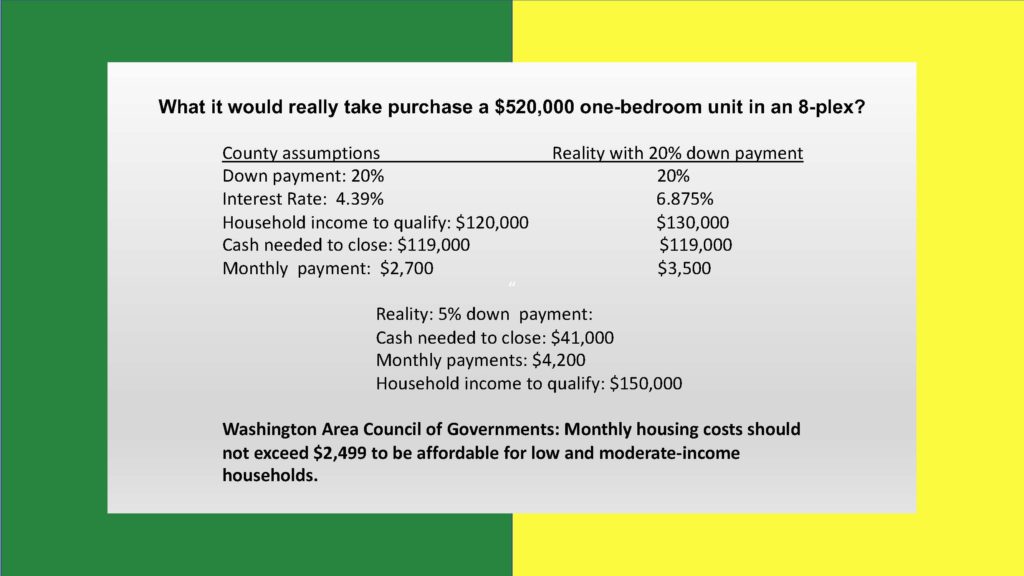Today, at the Reality Check Rally at Innovation Elementary School, over 500 people gathered to demand that the Arlington County Board stop the rush to enact a flawed Missing Middle Housing Plan (MMHP) that experts and many residents agree is not ready for prime time. (View the livestreamed Rally on Twitter @ _AFUT.) Co-sponsored by Arlingtonians for Upzoning Transparency (AFUT) and Arlingtonians for Our Sustainable Future (ASF), the Rally featured local housing and other professionals who said that County promises made to Arlington residents when the MM Housing Study was launched have not been kept.
Instead, the current plan will accelerate gentrification, reducing Arlington’s diversity; displace moderate-and low-income households, including seniors, persons with disabilities and renters; raise property values and taxes; reduce tree canopy and greenspace; and further overload schools, infrastructure and services. The County has not studied potential impacts nor developed strategies to address them. See table of County claims – and the Reality.
“The Missing Middle Plan is the most over-hyped and over-sold scheme since the streetcar fiasco a decade ago,” said John Vihstadt, former Arlington County Board member (2014-2018). “Far from delivering on the County’s laudable goals of adding affordable housing, increasing diversity and enhancing the environment, it will diminish all three by further inflating land values, incentivizing the teardowns of modest bungalows and ramblers, and degrading our already dwindling tree canopy. According to the County’s own 2022 Profile, Arlington’s existing housing stock is already 71.3% multifamily and climbing. We need to grow the supply of single-family homes and ownership opportunities–not shrink them!”
The County Board is expected to take its first vote on January 21 to advertise zoning and General Land Use Plan amendments to enact the MMHP — despite two Planning Commissioners voting in December against going forward with the Plan at this time. They cited concerns about “a lot lacking and missing” in the Plan, needing more time to know “what we are signing up for,” and the County not fully preparing for unintended consequences. The Board’s final vote to approve the Plan is expected in March.
Speakers at the Reality Check Rally highlighted the County’s many contradictory, confusing or incomplete explanations about the MMHP. As new facts about the Plan’s impacts have come to light, the County has continued to shift its messaging about what MMHP will and won’t do.
“A County Board Member recently said, ‘we can only have a conversation if we have the truth,’ and Missing Middle is missing too many facts,” said Jon Ware speaking for ASF. “Bad data and no data are a planning recipe for disaster, and the County admits it hasn’t done its homework on issue after issue, including on displacement and gentrification, unlike the few other communities experimenting with far more limited upzoning,” he added.
Rally speakers discussed how the County’s lack of proper analyses have created a flawed plan that will not create housing for low-and-moderate income residents and will result in teardowns of the most affordable homes.
County officials continue to insist that the new Missing Middle housing will be more “attainable” for teachers, public safety employees, service workers and others. In fact, in most cases, new housing will be even more expensive than existing housing.1 Median incomes for Black, Hispanic and senior households and average teacher incomes are all well below what is needed to purchase even the cheapest MM unit.
Rally Speaker and Mortgage Loan Specialist Joanne Swain explained that even the smallest one-bedroom unit in an eight-plex would require a household income of $150,000, with closing costs of $41,000, and monthly payments of
$4,200.2
Kathy Rehill, licensed residential realtor (recognized as one of Washingtonian Magazine’s best realtors) and 28- year resident of Arlington, said, “Developers will seek out the least expensive lots, resulting in teardowns of the most affordable single-family homes and replacement with multi-family buildings with 4-8 rental units. New duplexes will be very expensive; in the $1.4 to $1.8 million range for each unit. How do we know? Because in areas where duplexes are allowed now, for example in Halls Hill, we are seeing teardowns of modest single-family homes to build these very expensive duplexes with accompanying gentrification and loss of diversity in Arlington’s historically black neighborhoods.”
Former Arlington Planning Commission Chair Elinor Schwartz and president of Elinor Schwartz and Associates (a commercial real estate consulting firm) agreed with Rehill and added that the plan will lead to a loss of units with a greater number of bedrooms saying, “The Plan will result in teardowns of relatively more affordable housing that have more bedrooms than the new MM replacing them.” She observed, “Renters will be displaced as developers build more expensive units,” and declared that, “Arlington has no strategy to ensure that there is no net loss of more affordable housing and I challenge the County to be accountable through a demonstration requiring guardrails with annual caps and use permits.”
Michael O’Grady, research economist with Virginia Commonwealth University’s Center for Urban and Regional Analysis and former research analyst for Arlington Economic Development, said, “Nothing in this Plan incentivizes construction of housing that is affordable. Developers will maximize profits by building housing for high-tech and high- income Amazon, Raytheon and Boeing employees. The County’s Plan is a market deregulation and we learned during the 2008 financial crisis about the results of unregulated markets. Passing this flawed Plan now and hoping to fix it in the future won’t work – developers won’t let that happen.”
Former Planning Commission Chair Brian Harner said, “The County Plan will not measure up to future Arlington needs for the environment, affordability, historic preservation and neighborhood character. It is a flawed premise that multi-family buildings will be like single-family homes now because the MMHP allows greater density and height than [MM plans in] other cities like Portland and Minneapolis. Residents have not been adequately consulted. The County Board should slow down and rethink this simplistic, one-size-fits-all and arbitrary Plan.”
David Gerk, a 20-year resident of Arlington, attorney, engineer, AFUT member and dad of kindergarten and pre- school kids, addressed the Plan’s impact on schools. He said, “Arlington is already struggling to provide classrooms in our overcrowded schools. The Missing Middle Plan will mean a future with more overcapacity schools, more relocatable (trailer) classrooms, more kids per classroom and less resources per student. Is this future desirable – or necessary? Will parents interested in providing a good education for their children even stay in Arlington?”
“Today we heard from experts in their fields,” said Julie Lee, civic association president and a founding member of AFUT. “It is time for everyone to hear the REALITY of the County’s Missing Middle Housing Plan. The County Board must stop the rush, do the work that needs to be done – and that should already have been done — and ensure that everyone understands what this plan does and does not do.”
For more information on the Rally, go to AfUT.org or ASF-virginia.org.
Media Contacts: Julie Lee, jfblee@aol.com. AFUT
Michelle McMahon, mamcmahon@gmail.com, ASF
1 Missing Middle Housing Proposal and Draft October 31, 2022 Zoning Amendments – Impacts on Arlington and Its Comprehensive Plan, ASF, December 12 2022, pages 16-17.




